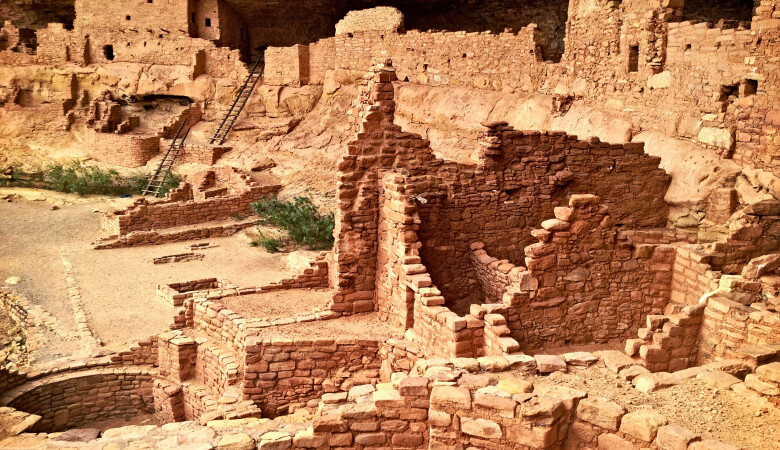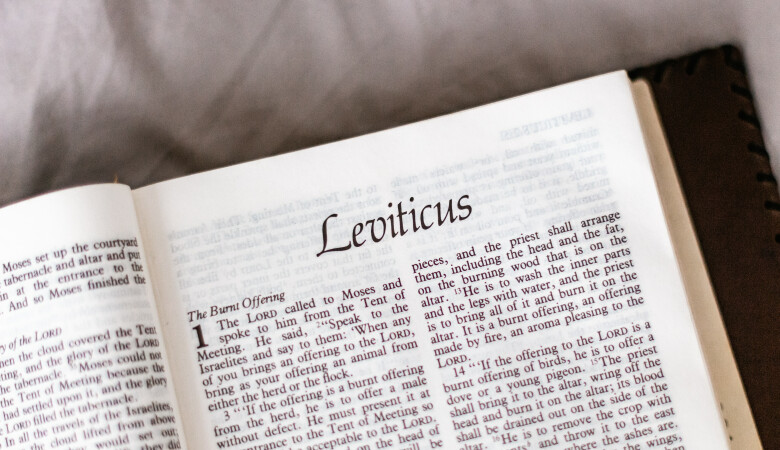May God Work in You What is Pleasing to Him (Hebrews Sermon 74 of 74)
August 05, 2012 | Andy Davis
Hebrews 13:20-25
Sanctification, Good Works
Created for Workmanship
Living so close to Colonial Williamsburg my wife and I, our kids have often been there and we love going there. I love history and there's so many things to love about the way that they've set up that community there, but probably my favorite part, and that's true for most people, are the historical trades workers that are there doing, plying different trades and you can just go in and watch and learn how they do the various things that they do. Everyone has their favorite. Probably the baker is the number one favorite for many people. Very good at making various types of cookies of course. I personally enjoy the blacksmith. I like seeing the way that the guy heats up the coals red hot with the bellows and pulls out the iron and smashes it and sparks flying everywhere and the way they're making nails or hinges or whatever.
The cooper building barrels, the joiner making furniture. Seeing a desk being made or a musical instrument, special skill there, the silver smith. Some people like the gunsmith, the guy is rifling a long barrel and how difficult that was to do and the precision that went into making it, all of those things are marvelous. And I was thinking about that in terms of our message today, because that kind of work that's going on, that craftsmanship that's going on all the time there in Williamsburg is going on at a much larger scale, around the world as Christians are using their spiritual gifts to do various ministries that God has prepared for them to do. And it's a marvelous thing for us to be craftsmen and craftswomen for the Lord, for us to use our gifts and to do labors, to do works that God has ordained for us to do.
And as we think about this message today, my heart goes to the idea that God has shaped and crafted us and is continuing to work on us as though he is the craftsman on us and we are the work piece so that we can then do the same thing in the lives of others. I'm thinking, of course, of Ephesians 2:10, which says, "We are God's workmanship created in Christ Jesus to do good works which God prepared in advance for us to do." And that's what the author has in mind as we look at this incredible doxology, what I'm going to call a prayer, that he prays for his listeners. Look at verses 20 and 21, "May the God of peace, who through the blood of the eternal covenant, brought back from the dead our Lord Jesus, that great shepherd of the sheep, equip you with everything good for doing his will and may he work in us what is pleasing to him through Jesus Christ to whom be glory forever and ever, Amen." We're going to spend almost all of our time on those two versus trying to understand this prayer and the prayer's simple message is this, May God work in you, so you can work for him. That's the fundamental idea here, may God by his grace continue to work in you so that you can work for him
I. The Prayer’s Simple Message: May God Work So You Can Work
Now, in context, having sought prayer, the author now offers prayer. Look back at verses 18 and 19, he says, "Pray for us. We are sure that we have a clear conscience and desire to live honorably in every way. I particularly urge you to pray so that I may be restored to you soon." So there are certain things that the author here wants prayer for. And so prayer very much a two-way street here, but now he's offering up a prayer for them. And we learn a vital lesson. This is just one of the great messages, the great sermons there's ever been preached in history. This is what the author calls a brief word of exhortation. I'll get to that later. This is my 74th sermon in Hebrews. But at any rate, just so much to learn and the author marvelously calls it a brief word of exhortation and that's an incredible statement to make, in that it's over 300 verses. It would take almost an hour to read and it's one of the longer epistles in the New Testament.
What's brief about it? In effect, he is saying, "Oh I could have gone on a lot longer about these themes." The themes are so majestic, so exalted, so glorious. We have such a vision of Christ as our great high priest and of his finished work on the cross for us and of his constant interceding for us at the right hand of God such a vision of what he has done for us in redemptive history, in fulfilling and finishing the Old Covenant and ushering in this New Covenant. There are so many things the author could have told us and we could have gone on and on but the author having given this marvelous word of exhortation he now desires in some way to pray it into his people. And this is a message for me as a preacher. It doesn't matter how great the sermon is it needs to be accompanied by prayer.
A faithful minister of the word needs not only to proclaim the word to the people but also pray it into the people. And so the author is in effect doing this as Samuel said, "Far be it from me that I should sin against the Lord by failing to pray for you." And so the author is praying for them and it's in the form of a kind of a doxology or a prayer. And as I said, the simple concept of this prayer is, "May God work in you so that you can work for him." Look at the words, "May God... " I'm simplifying it here. "May God equip you with everything good for doing his will and may he work in us what is pleasing to him." Or to simplify it even more, "May God equip us and work in us so we can do his will and please him."
So this is a powerful and a humbling and a needful message. It is humbling because we're being told in effect, what Jesus said in John 15, "I am the vine and you are the branches. If you remain in me and I remain in you, you will bear much fruit, for apart from me you can do nothing." So the author in effect is saying you must have more grace, ever more grace, fresh effusions of grace, grace must be flowing into your life from God the Father or you will achieve nothing good and you will in no way be pleasing to him. And that's why it's very humbling. Paul gives it to us also in doctrinal form in Philippians 2:12-13, he says, "As you have always obeyed, not only in my presence but now much more in my absence, continue to work out your salvation with fear and trembling for it is God who works in you to will and to do according to his good purpose." Same idea, that as God works in us we then work. We work out our salvation with fear and trembling and we do good works for him and so this is amazing.
We are blood-bought, we are forgiven, we are adopted into the family of God, we are royal sons and daughters. We're justified, completely forgiven of all of our sins, we are in dwelt by the Spirit, we are going to heaven. And yet we still need lots and lots of grace, we need lots and lots of help to live lives that are worthy of that calling that we have, and so this causes me to lament my own wickedness, my own sinfulness, my own weakness. To look again and afresh at what I am, who I am apart from Christ and who I am now in Christ and even more, it causes me to celebrate the great grace of God the triumphant, omnipotent grace of God and the wisdom of God in doing this for us.
The topic here is our good works and those good works are awesome. I've broken them. We've broken them as elders into two main categories: Internal journey good works and external journey good works. The good works of the internal journey are working out your salvation with fear and trembling. Growing in grace and in the knowledge of Christ, becoming more and more conformed to Christ. Loving what Christ loves, hating what he hates, putting sins to death by the power of the Spirit, being a valiant warrior in the battle against sin, those internal journey good works. And then those external journey good works where you're ministering to others. Well, there are other Christians within the body of Christ we could call external in that way or all of us together to the world out there that needy world, lost, dying, Ephesians says, "Without hope and without God in the world." Desperately needing a savior, needing Christ. Broken by sin, grieving, distressed, poverty-stricken, needing ministries of mercy, needing definitely the Gospel.
These good works are so awesome, there are such eternal consequence that Jesus made this astonishing statement in John 14 the night before he was crucified. He said, "I tell you the truth, anyone who has faith in me will do what I have been doing, and indeed he will do greater works than these because I go to the Father." Now, that's an amazing statement. How can we do greater works than Jesus? I mean, he did signs and wonders of such a magnitude and of such a quantity that we would... John said that if we wrote all the stories down, even the world couldn't contain the books that would be written. Well, Jesus didn't mean I think there in John 14, that we will do greater miracles than him. There's not a single figure from church history who has done anywhere near the river of healings even resurrections of the dead that Jesus did. He stands alone and that is his unique glory as the Son of God. To do far more miracles than anyone has ever done. And of a quality of a kind, like raising Lazarus from the dead on the fourth day.
But no, what Jesus is saying is, because the church multiplies and spreads to every tribe and language and people and nation, more and more people believing in him, and then equipped, and empowered by his grace doing these good works they are in scope and magnitude greater than anything that he did in the three years that he was walking in Palestine. That's how I interpret the verse. And so we see the wisdom of God then in this teaching because these are good works that are well worth doing and they will in some way, be a topic of conversation for all eternity. And so we must be humbled before we do them, Amen. We need to be really humbled and we need to recognize that apart from the grace of God we won't do any of them. And it's only when empowered by the spirit of God that we will do each one of them, so to God be the glory for any progress you make in the internal journey. To God be the glory when you put any single temptation to death by the sword of the Spirit. To God be the glory, when you open your mouth and speak to any lost person in the name of Jesus. To God, be the glory. We must have this grace.
We were left here on earth to do these good works. God is the craftsman, the master craftsman. We are the workmanship. And we are crafted and we are molded for good works which God prepared in advance for us to do. Now, if I put the two concepts together. So Ephesians 2:10 which I just quoted again and this passage in Hebrews 13. Ephesians 2:10 says that God prepared the good works in advance for us. Hebrews 13 is saying the opposite. God prepares us in advance for the good works. Isn't that marvelous? And in that way he's orchestrating the whole building of the church of Jesus Christ. And without this advance preparation we will not do any of these good works. But at the end of a fruitful, healthy Christian life we will have some emblems of our own faithfulness, that survive the testing of fire on Judgment Day. It's been purified by the testing of God's assessment that gold and silver and costly stones in some way it's pictured crafted together into a crown that's on the heads of these 24 elders. But you know very clearly in Revelation 4, they constantly are falling down before the throne and casting their crowns before God and you know what they're saying, they're saying to God be the glory for any good thing we ever did. To God be the glory. So, we will cast our crowns but first we need to go earn them, we need to go do the works, Amen. We've got to do the works and may God prepare us for them. May God use this message to prepare you to do a river of good works this week, Amen. Let's go do them to the glory of God.
II. The Prayer’s Details... Phrase by Phrase
So what I want to do now is I want to take this incredible doxology or prayer and just look at it phrase by phrase. I want to take it out like a box of costly chocolates with the hidden internal. You know they actually make something that you can suck out the internal part and sample it to see if you want to invest the calories on that, if it's like an orange marmalade thing you may not want to go there. But you may, you may like that but we're going to actually take each of these phrases like a filled chocolate and we're going to savor it. And in doing this I'm hoping to do two things. One is just to explain the text and the other is to give you a methodology of Biblical meditation. There's some portions of Scripture especially the Epistles are just so rich that you just take these phrases and just let them, just savor them, taste and see that the Lord is good. And so let's do that with this one because I think it'll pay back our effort.
"May the God of peace, who through the blood of the eternal covenant brought back from the dead our Lord Jesus, that great shepherd of the sheep, equip you with everything good for doing his will. And may he work in us what is pleasing to him through Jesus Christ to whom be glory forever and ever, amen."
To some degree this is a brief summary of the entire Epistle. I've summarized the Epistle in this way, that a superior mediator, Jesus Christ, brings a superior covenant, the new covenant, resulting in a superior life for the people of God, the life of faith. You can see how this kind of culminates, it goes through the superior mediator, may Jesus Christ that great shepherd of the sheep etcetera. It talks about the elements of the New Covenant, how Christ's death has bought that for us. And how it leads us into a life of fruitful good works to his glory, you see that by faith. And so this is a bit of a summary here. The God of peace versus the God of fire, you have the blood of Christ versus the blood of bulls and goats, you have the eternal covenant versus a temporary covenant, you have a resurrected mediator who's standing at the right hand of God, everything comes to us through Jesus Christ, Amen. And so we have him at the right hand of God ministering these blessings to us.
And we have Jesus Christ called that great shepherd of the sheep versus sinful flawed mortal men who were priests in the Levitical priesthood who could not continue to be our priest, who had to offer sacrifices first for their own sins then for the sins of the people and who then died and then their successors took over. So we have the superiority of Christ and working in us good works well-pleasing to God that done by faith versus the works of the law which only work death in us. And so in some senses, we have an overview of the entire Epistle.
May the God of Peace
Now, let's look at it phrase by phrase. First, may the God of peace. So this is a prayer directed toward the first person in the Trinity, toward Almighty God, God the Father, God the creator, God the king. And here he's characterized in this way, may the God of peace, may the God of peace. There are two ways to understand this. May the God who is characterized by peace or peacefulness that kind of thing, God sitting at peace enthroned above the circle of the nations. The God who is enthroned in heaven and does whatever pleases him, the God who is serenely in charge of the entire universe and cannot be moved from his pleasure, may the God of peace... It's a powerful image. Or you could conversely say, may the God who gives peace, the God who gives that peace to us. And here my mind goes to the Gospel itself how this God created the entire world at peace, created it to be good, even very good. As the creator he displayed his goodness in weaving together this beautiful world, this cosmos, that God has made. As the creator he has the right to be king as the king he has the right to be law giver.
And he gave the law to Adam and Eve in the garden that they should not eat from the tree of the knowledge of good and evil, he had the right to do it and to assign a penalty to it. For the day they ate it, they would surely die. We know very well that our first forefather Adam sinned against Almighty God and he broke the relationship with God therefore man was not at peace with God, and God not at peace with us. There was a spiritual war going on and many of the people who are at war with God don't even know that they're at war with God or that God is at war with them, that the wrath of God is remaining on them because they're not in Christ. It says in Colossians 1:21, that at one time we were enemies with God, alienated as shown by our wicked behavior. God was at war with us and we at war with God, but because of the blood of the eternal covenant, we'll talk about it in just a minute, God has worked peace with us, we are now through Jesus Christ reconciled to God. And God is at peace with us and he will be forever. And so Jesus is able to come in John 20 and show his hands and his side and the evidence and the cost of what he achieved on the cross and he says, "Peace be with you." Just like in Romans 5:1, "Therefore since we have been justified through faith we have peace with God through our Lord Jesus Christ."
Who Through the Blood
"May the God of Peace, who through the blood." We come to this blood again. There is no book that explains the blood so accurately and so carefully as the book of Hebrews. We've learned about it in Hebrews 9:13 and 14, "The blood of goats and bulls and the ashes of a heifer sprinkled on those who are ceremonially unclean, sanctifies them so that they are outwardly clean. How much more then will the blood of Christ, who through the eternal Spirit offered himself unblemished to God, cleanse our consciences from acts that lead to death so that we may serve the living God." So if the blood of bulls and goats effectively clean people up and enable them to take part in the temple worship how much more then the blood of Jesus, the Son of God the only begotten Son of God shed on the cross, cleanse our consciences. You see the blood of bulls and goats has no power to cleanse conscience. They still felt guilty for their sins but the blood of Jesus has power to free you from a guilty accusing conscience.
And I don't know that everyone I'm talking to right now has already fled to Christ by faith, I don't know if you're at peace with God and God at peace with you, I can't tell by your faces. And I'm urging you right now as though God were making his appeal through me, be reconciled to God. God made Jesus who knew no sin to be sin for us so that in him we might become the righteousness of God. Flee to Christ, don't leave this place unreconciled to God, don't leave this place with a guilty conscience. The blood of Jesus is infinitely greater than your guilty conscience, it's an infinite provision for your guilt. Flee to him. You don't need to do anything, just look to Christ, call on him, trust in him. It's really that simple. But without the shedding of blood there could be no forgiveness. Says it very plainly in that same chapter, in Hebrews 9:22. If Jesus' blood hadn't been shed, we could not be forgiven, but now that his blood has been shed, we can be forgiven and if you just embrace him by faith, you will be forgiven. You are forgiven now, the blood.
The Blood of the Eternal Covenant
And what else does it say? "The blood of the eternal covenant." What does this phrase mean, the blood of the eternal covenant? Well, there are many covenants in the Old Testament era, indeed the word testament is another word for covenant. That's what it means. Covenant's a binding agreement between two or more parties. And God has chosen again and again and again in redemptive history to deal with people through covenants. You have the covenant that he made with Noah in which he swore never again to destroy the earth by a flood. And you have the covenant that he made with Abraham, to be a God for Abraham and Abraham would be his and his descendants would inherit the land, the promised land and through his offspring, all peoples on earth would be blessed, the covenant with Abraham. And then you have the covenant of Moses a conditional covenant, it's the covenant the author has in mind here, what he calls the Old Covenant, that's the conditional covenant made with the Jews that if they kept the precepts of the law God would allow them to continue in the promised land and he would continue to be a covenant God for them but if they broke those stipulations God would bring on them the curses of the covenant, he would evict them from the promised land, and he would kill them.
So it's a conditional covenant and that's what Paul means when he says that the law brings death. Because we could not keep the stipulations of that covenant. And then we have the covenant that God made with David, in which God swore to raise up a son of David, and give him a kingdom that would last forever and ever. So those are covenants that God... Is that what the author is talking about here? No, he mentions here the blood of the eternal covenant. The blood of the eternal covenant. So I think it's called eternal for two important reasons, one of them looking back in time and the other one looking ahead in time. So let's look back in time. It's called the blood of the eternal covenant because it was made in eternity. It was made in eternity past, this covenant was made before the world began. This covenant was made between the Father and the Son and the covenant went like this. The father said, "I will elect some people, I will choose them before the foundation of the world, if you will shed your blood for them, then I will forgive them and adopt them. And they will be my people and I will be their God." And so we have election where we're told in Ephesians 1 that we are chosen before the creation of the world.
And we have Christ's death in some sense, happening before the world began. How it says in Revelation 13:8 that he is the Lamb that was slain from the creation of the world, though he hadn't been even born yet of a virgin still in the mind of God, Jesus had shed his blood before God said, "Let there be light." that's an awesome thought. Jesus existed as the second person of the trinity, the Son of God under the shadow of the cross throughout the whole Old Testament era. Every time an animal is offered Jesus in heaven was thinking about his own future death. Now both of those election and Christ as the lamb of God put forward for our sins were revealed in space and time at a specific moment in time. Individually it's elect, is shown to be elect by how they respond to the Gospel. We don't know who they are until they respond to the Gospel, when they respond favorably to the Gospel, then what God did before the foundation of the world becomes clear, so also with Christ. When Jesus was born, it says in Galatians, in the fullness of time, at the right time, born of a virgin, born under the law, that he might redeem those under the law.
At the right time Christ was revealed as it says in 1st Peter 1:18-20, "For you know that it was not with perishable things such as silver or gold that you were redeemed from the empty way of life handed down to you by your forefathers but it was with the precious blood of Christ, a lamb without blemish or defect. He was chosen before the creation of the world, but has now been revealed in these last times for your sake." Wow! Chosen for what before the creation of the world? Chosen to be our lamb. Chosen to be the one who would shed his precious blood for us. And so when I see this phrase blood of the eternal covenant, then that's what I have in mind. The elect chosen eternally before the foundation of the world, the son chosen to die for them. And therefore, every Old Testament saint that was ever saved was saved by this same covenant. Same way, they're saved the same way you are. We're all justified by faith in Jesus.
Now, they had less information than we have. We have more information now that Christ has come. We have the four Gospels: Matthew, Mark, Luke, and John but we're saved by the same way we hear God's word and believe it, Amen. We hear God's word and we believe it. We're justified by faith in the Gospel of Jesus Christ. And so this is the very point being made in Romans 3, God sent Jesus to be a propitiation, a sacrifice of atonement through faith in his blood, he did it to demonstrate his justice at the present time because in his forbearance he had left the sins committed beforehand unpunished.
Do you remember when David committed that sin with Bathsheba? And murdered her husband to cover it up because she was pregnant, remember that whole story. And then God sends Nathan the prophet, Nathan accuses him, "You were the man." David repents says, "I have sinned." He admits it, and then Nathan says these amazing words, "You shall not die." Wait a minute, how is that possible? How is it that he shall not die? The wages of sin is death, how is it that a man like David can go from that kind of action up to Heaven? Where's the vindication of God's justice? Well, Jesus is the vindication of God's justice, that's what Paul said. To vindicate his justice to display that he had actually dealt with the sins committed beforehand he did it through Jesus, he did it afterwards. Okay. And it also says in Romans 4, that Abraham was justified by faith just like we are and so also is David. And so looking back, the eternal covenant, before the foundation of the world and covering all the Old Testament saints the same way.
So that's why some people speak of what they call covenant theology. So our Presbyterian brothers and sisters talk about covenant theology and they're really going to emphasize there's just one covenant by which people are saved. I understand that, I respect it, I think it's true, I think we should all be in that sense covenant theologians. I reject that the sign of the covenant moved over from circumcision to infant baptism. I don't find that taught in Scripture, another sermon for another day. With your permission I'll move on from infant baptism. But there is this eternal covenant. And Jesus shed the blood of the eternal covenant. The eternal covenant also looks ahead, not just back but it looks ahead. It's eternal because that Old Covenant was temporary, it's obsolete and aging, soon disappear the author says in 8:13. Well, not this covenant, this covenant will never be obsolete. It can never age. It will never disappear. By the blood of Jesus we will spend eternity with God forever and ever. So when we've been there 10,000 years, bright, shining as the sun, there's no less days to sing God's praise than when we first begun. The eternal covenant guarantees that, the blood of the eternal covenant. You're saying pastor at this rate, we won't finish even these two verses so let's move on.
Brought Back from the Dead
These are rich, rich phrases through the blood of the eternal covenant, brought back from the dead. This is talking about the bodily resurrection of Jesus. How is Jesus' resurrection achieved through the blood of the covenant? What is the link between the blood and the resurrection? First of all, just acknowledge there is one. As a matter of fact, in my mind I almost never can think about the crucifixion without the resurrection, we don't merely preach Christ crucified. Paul didn't mean that in 1st Corinthians 2. "We preach Christ crucified" and resurrected, Amen. And by the blood of the covenant, in effect what's happening is God the Father is saying, I accept what you did and I prove it by raising him from the dead. So through the blood he shed as a man, as a real man it was acceptable to God, the judge, and he proved it by his resurrection, isn't that marvelous? And he's going to prove in the end, finally, your total forgiveness by raising you in a body like his. And that's the finish line of salvation. Interesting, the Greek phrase here, it implies almost an exodus, to be brought from a lower place and moved on up to a higher place, that's what it is.
And so through the blood Jesus has been moved from the grave and went, ascended through the heavens and now is seated at the right hand of God. There's a journey implied here that the author has already taken us on. So through the blood of the eternal covenant brought back from the dead and then he says, "Our Lord Jesus." how sweet are those words, how sweet the name of Jesus. He says Jesus twice in these two verses. We need to say the word Jesus more. We need to say the word Jesus more to our unsaved neighbors. God isn't enough. I'm not meaning disrespect or blasphemy, but I don't know what they mean by God. If there's a Christian athlete, someone out there, please say Jesus. Friends, this is one of the battles we're going to fight in the 21st century, the exclusivity of Christ and of the Gospel. We're fighting other battles. Look at Chick-fil-A this week, what an interesting week, what an interesting culture we live in. What an important time for us to stand firm for the truth. But let's stand firm for this. Salvation is found in no one other than Jesus, there is no other name under heaven given to men by which we must be saved.
Our Lord Jesus
And Jesus is our Lord. The word Lord Kurios. The Old Testament... The Greek-speaking Jews when they translated the Old Testament into Greek used the word Kurios, Lord, to translate what we say Yahweh or sometimes Jehovah, the capital L-O-R-D, the big... The four letters, they use Kurios. When it says, "Our Lord Jesus." the author is meaning our God, Jesus, the creator of the ends of the earth. And he is our Lord because he died for us, and he was raised for our justification, and he lives at the right hand of God always to intercede for us, he is our Lord Jesus.
That Great Shepherd of the Sheep
So much for verse 20. "May the God of peace who through the blood of the eternal covenant brought back from the dead, our Lord Jesus that great shepherd of the sheep. Oh, oh, what happened to that great shepherd of the sheep. I forgot that, please, let's look at it. What does it mean that great shepherd of the sheep? How about this one, the one that was predicted, the one that the Scripture told us was coming, the one who has come according to Micah 5:1 and 2 says very plainly, "But you Bethlehem Ephrathah, though you are least among the people of Israel out of you will come a ruler who will be shepherd of my people Israel." There would be a shepherd born in Bethlehem who would stand in the strength of God and shepherd his flock and he is a great shepherd, the greatness of Christ, of his person and of his blood and of his... The price that was paid.
And he isn't the shepherd of everybody. Now don't misunderstand that, he is not everybody's shepherd. He said the reason... He said to his enemies, the reason you do not believe is that you're not my sheep. I said before, that will blow your circuit breakers. Not the reason you're not my sheep is that you don't believe, it's the reason you don't believe is that you're not my sheep. Election comes before faith. Election is the ground of faith. Because we're chosen, then we believe and when we believe then we follow. Jesus is that great shepherd of the sheep and he is shepherding your souls right now, feeding you, nourishing you, protecting you from evil, restoring your soul, making you lie down in green pastures, filling your cup to overflowing. Alright, may this God who has given you this great salvation, this great Savior. This is everything he's achieved for you, now he wants you to get to work.
Equip You with Everything Good
But before you can get to work, he wants to give you grace, "May he equip you with everything good." Do you see that? It's amazing after all that's been done for us, after all of the provision that we've just looked at, you still need more. It says in 1st Peter that he gives us more grace. We need more grace, and if you have enough grace you don't need more grace, you're fine on grace. You need more grace. "So God please give me more grace. Oh God, please equip me with everything good for doing you will."
So what does this word equip mean? Well, the word equip or perfect means to make you fit or able or suitable, capable thoroughly outfitted to do every good work. There is a negative aspect of this and a positive. Negatively, may he in effect rectify what's wrong with you. Not trying to be insulting but may he fix you so you can do the good works. If he doesn't repair you, you won't do the good works. Why is that? Well, it's because of your flesh. The very thing I hate I do and the other side, the very thing I want to do I just don't do it. So basically, "God would you please fix me? So I actually do the good things I intend to do. I don't want to have a bunch of good intentions and very few good works. I want to actually do the good works. I want them actually to happen in space and time. Oh God equip me. Overcome my flesh. Stop me from being so selfish, stop me from being so lazy. Stop me from being so worldly and caring too much what people think about me. Oh God, overcome my flesh. Stop my racism, stop my selfishness, stop my materialism. God make me a different man, a different woman so I can do the good works you have for me to do."
So, may he equip you negatively. I would suggest this in the air of evangelism, start praying this. Say, "God give me a genuine broken-hearted love for the lost, help me to love them. Not hate them for what they're doing and all that, but humbly to realize I'm no different except by the grace of God and help me to genuinely love them." I think as God does that, that plus some other things that he could do but fundamentally that. If you have a rich heart of love toward lost people, if you can do what Jesus did, weeping over Jerusalem or seeing that the people are harassed and helpless like sheep without a shepherd, you'll be more evangelistic so pray that God would equip you with a heart of love for the lost. Okay, So, that's negatively.
Positively, he equips you for every good work by teaching you and instructing you and giving you the tools of the trade. So your gift may be encouragement, it may be administration, it may be giving. He equips you with everything good for doing his... By giving you lots of money if you have the gift of giving or any money at all, just that is an equipping. Or by good teaching. You hear good sermons, you read a good Christian book, he's equipping you to do good works. That's my job primarily and the elder's job as pastor-teachers to prepare God's people for works of service, so that the body of Christ may be built up. I'm kind of giving you equipment so you can go do your good works, isn't that awesome? I mean, what a great, great job I have.
And other people have equipped me with their books that they've written and things that I've learned from them. Marvelous. And so, we are God's workmanship and he's working on us and he's equipping us with everything good and he's working both sides of the equation. I don't have time to go into this in detail, but look at Acts 10 on your own and how God prepared Cornelius on his side of the equation, Gentile-Roman whatever, by a vision, and all that and then he works over in Peter, the Jew and prepares him remember with the sheep and all those nasty animals, reptiles and all that. "Get up Peter, kill and eat." "Never Lord, it's not kosher. Lord, I'm surprised at you. Don't you know the kosher regulations?" "Peter, I'm surprised at you. Don't you know we're in the New Covenant now? Time has come. You can eat anything you want." Jesus declared all foods clean. And don't call anything impure that God has made clean. The lesson had nothing to do with food, had to do with people and if God hadn't prepared Peter, he wouldn't have walked across Cornelius's threshold, into a Gentile home and witnessed to him.
But God prepared both sides of the equations the man for the good work, and the good works for the man. It's going on both sides, isn't that awesome when you think about missions? God's getting missionaries ready here, and then he's working something over there and at the right time he marries them together and good stuff happens. May he equip you with everything good for doing his will. That's the definition of a good work. Okay, his will. Oh God, let me do your will today. Not my will but yours be done. Oh God. Jesus said this, "My food is to do the will of him who sent me, finish his work." God's not looking for freelancers, he's not looking for innovators. He's looking for obedient servants who present their bodies to him as living sacrifice, and say, "God command me and I'll obey you."
"So God will you please equip me with everything good for doing your will, what your will is, and may you work in me what is pleasing to you?" He's not looking for hypocrites. He's not looking for people who look good on the outside and inside they're full of dead men's bones and everything unclean. He's looking for a genuine heart after God. Now, every good work is tested by these three heart attitudes that you must have. If you don't have these three it isn't a good work. First, the work must be done for the glory of God, whether you eat or drink or whatever you do, do it for the glory of God.
Secondly, the work must be done by faith. Anything that does not come from faith is sin, Romans 14:23. Third, the work must be done out of a heart of love for the person you're doing it for. If I speak with the tongues of men and of angels but have not love, I'm a resounding gong. If I surrender my body to the flames and give all of my possessions for the poor, but I have not love. If I don't have a heart of love for the people, it isn't a good work.
Those are the three things. For the glory of God by faith because you love out of love for the person. Oh God, work that in me, that's not natural to me, that's not naturally who I am. Oh, God, would you please work that in me supernaturally? It's the very thing that I think Jesus is praying for now at the right hand of God and that's why it says through Jesus Christ, this happens only through Jesus Christ. He is praying for you by name. He knows each of you his sheep by name. Use my name, "Oh God, would you please work in Andy a disposition to do good works today? Would you please transform his heart? Conform it to mine. Father, would you please make the way open for him to do the good works that we have arranged for him to do? Would you give him a heart of willingness to do it?" And that's why at the end the author says to him be the glory forever and ever. Jesus gets the glory, it's Jesus that...
Through Jesus Christ
Through Jesus Christ to him be the glory. So to Jesus be the glory for all of my good works and yours.
III. The Author’s Final Words: Bear With Exhortation
Well, brothers I urge you to bear with my word of exhortation for I have preached only 74 short sermons and now they're over, lessons are eternal. Go back and read this any time you want. I know I could have preached 74 more. There's always more here. The word of exhortation means he's coming along side like the Paraclete and like the Holy Spirit convicting, encouraging, comforting, urging just doing different things with you, it's a fruitful word. So, bear with it, put up with it, put up with the good teaching. It's only a brief word I could have sent a lot more. And then he gives us a few greetings here at the end. Timothy has been released, greet all your leaders, those from Italy send you greetings, and then finally, grace be with you all.
As we close this sermon series in Hebrews, the lessons I got out of it first, the supremacy, the greatness, the glory of Christ. So I want you to start there, just as you're sitting there and thinking about it. Use Hebrews go back this afternoon and look at how he is the radiance of God's glory and the exact representation of his being, sustaining all things by his powerful word, look at the greatness of what Jesus has done, how he shed his blood once for all, for sinners like you and me and how God raised him from the dead and seated him at his right hand and he's there interceding for you. And everything he asks for he gets for you, everything. And so start with the greatness, the supremacy of Christ and then look at the benefits of the new covenant. Your sins are forgiven, it's done, it's finished. The Old Covenant didn't forgive any sins ever, it never did. I already covered that with the eternal covenant. It's not Old Covenant that saves us. And so your sins are forgiven, rejoice and be glad you have eternal life and out of that foundation knowing you can't improve your position go do a bunch of good works, live a good life, let your life be rich in good works.
Take these two verses and pray them for yourself, say, "God do this in me, equip me with everything good, make me pleasing to you, apart from you I won't be pleasing to you." and then pray it for one other person today, someone else that you know, someone in the church. Pick a name and pray these two, Hebrews 13:20 and 21, concerning another person. Close with me in prayer.






























